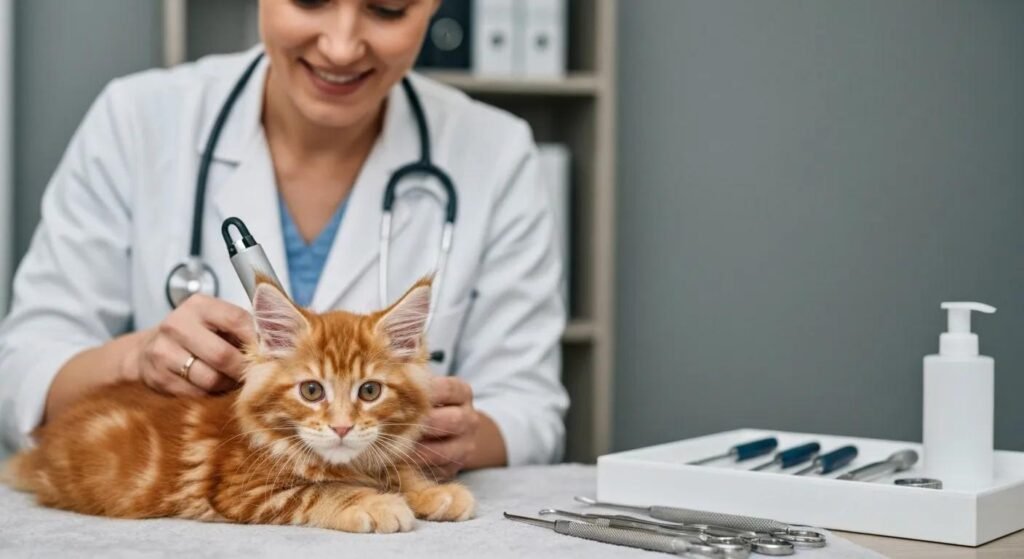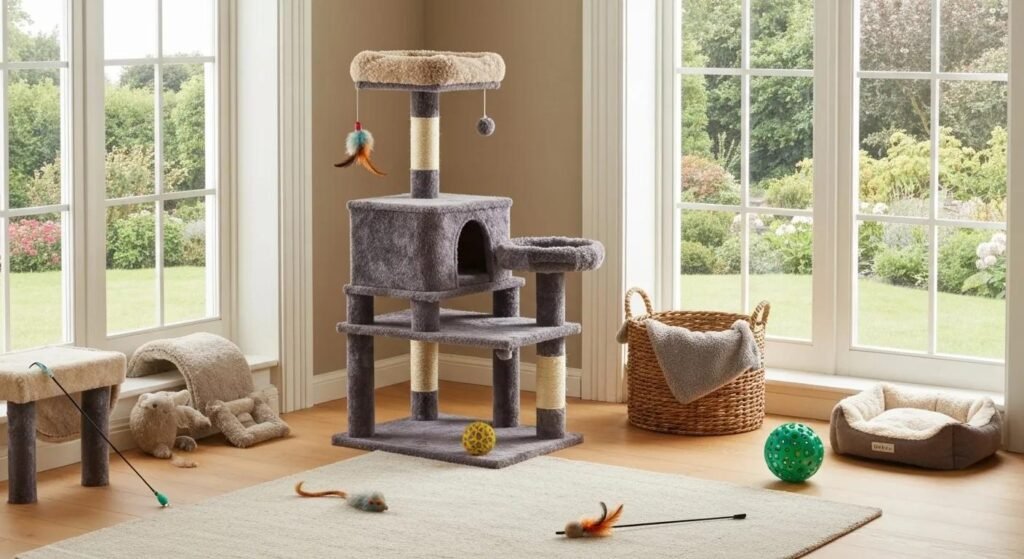
Essential Health Issues to Consider Before Buying a Maine Coon Kitten: Your Complete Guide to Healthy Kittens
Genetic heart disease affects up to 34 percent of Maine Coon cats, making early awareness of hereditary conditions critical for prospective owners. If you’ve ever asked, “what health issues should I be aware of before purchasing a Maine Coon kitten,” you’ve pinpointed the most important step in securing a long-lived companion. This guide outlines the top genetic diseases, early illness indicators, genetic testing protocols, vaccination schedules, breeder qualifications, home preparations, and final takeaways for families seeking a healthy, purebred kitten. Along the way, we’ll draw on Bellspurr’s rigorous screening standards and link you to our understanding maine coon health issues so you can confidently find a well-socialized, pedigree-verified kitten.
What Are the Most Common Genetic Health Issues in Maine Coon Kittens?

Genetic health issues are inherited conditions passed from parent cats to kittens through DNA mutations. Understanding these disorders helps buyers select certified breeders and anticipate lifelong care requirements. Examples include heart muscle thickening, joint malformations, motor neuron degeneration, and kidney cyst development—all of which demand targeted screening and management before adoption.
What Is Hypertrophic Cardiomyopathy (HCM) and How Does It Affect Maine Coons?
Hypertrophic Cardiomyopathy (HCM) is a hereditary heart muscle disease marked by thickened ventricular walls that impair blood flow and reduce cardiac output. Mutations in the MYBPC3 gene alter sarcomere proteins, leading to progressive diastolic dysfunction and congestive heart failure.
Hypertrophic Cardiomyopathy (HCM) in Cats
HCM is a common genetic heart disease in cats, characterized by the thickening of the heart muscle, which can lead to heart failure. Studies have shown that specific genetic mutations, such as those in the MYBPC3 gene, are linked to the development of HCM in various cat breeds.
Meurs, K. M., et al., “A Cardiac Myosin Binding Protein C Mutation in the Maine Coon Cat” (2005)
This research supports the article’s discussion of HCM by providing a scientific basis for the genetic causes of the disease in Maine Coon cats.
Before leaving our cattery, each kitten undergoes an echocardiogram and DNA screening to confirm absence of the MYBPC3 mutation.
| Symptom | Underlying Change | Health Impact |
|---|---|---|
| Lethargy | Reduced cardiac output | Decreased exercise tolerance |
| Labored breathing | Thickened ventricular walls | Risk of fluid accumulation in lungs |
| Heart murmur | Abnormal blood flow turbulence | Sign of structural heart abnormalities |
These hallmark symptoms and testing protocols ensure early HCM detection and inform ongoing veterinary monitoring.
How Can Hip Dysplasia Impact Maine Coon Kittens?
Hip Dysplasia is a developmental orthopedic disease in which the femoral head and acetabulum fail to align properly, causing joint laxity and arthritis. Improper breeding selection and rapid growth exacerbate cartilage wear, leading to pain and mobility loss.
- Kittens from parents with OFA or PawPeds hip certifications have lower risk.
- Early mobility tests and radiographs at 6–12 months confirm hip joint integrity.
- Selective breeding diminishes predisposition and supports normal gait development.
| Screening Method | Attribute | Interpretation |
|---|---|---|
| OFA Radiograph | Joint congruence | Grade I–IV indicates dysplasia risk |
| PawPeds Assessment | Hip joint laxity measurement | Low laxity correlates with healthy hips |
Hip Dysplasia in Cats
Hip dysplasia is a skeletal condition where the hip joint doesn’t develop correctly, leading to arthritis and mobility issues. The Orthopedic Foundation for Animals (OFA) provides hip evaluations, and breeders use these results to reduce the risk of hip dysplasia in their breeding programs.
Flückiger, M. A., et al., “Heritability of hip dysplasia in the domestic cat” (2004)
This citation supports the article’s discussion of hip dysplasia by highlighting the importance of screening methods and breeding practices to mitigate the condition.
Preventative breeding and timely screening reduce long-term discomfort and preserve an active lifestyle.
What Should You Know About Spinal Muscular Atrophy (SMA) in Maine Coons?
Spinal Muscular Atrophy (SMA) is an autosomal-recessive neurodegenerative disorder that causes progressive muscle weakness and atrophy due to motor neuron loss. Kittens inherit two defective copies of the LIX1 gene before showing clinical signs.
Spinal Muscular Atrophy (SMA) in Maine Coons
SMA is a genetic disorder causing muscle weakness and atrophy in Maine Coon cats. Genetic testing can identify carriers of the LIX1 gene mutation, allowing breeders to avoid producing affected kittens. Early diagnosis and supportive care can improve the quality of life for affected cats.
Gandini, G., et al., “Spinal muscular atrophy in Maine Coon cats: identification of the causative mutation and a diagnostic test” (2014)
This citation provides scientific backing for the article’s information on SMA, emphasizing the role of genetic testing in preventing the disease.
- Genetic testing at birth identifies carriers and affected kittens.
- Early signs include limb trembling, difficulty rising, and hind-leg dragging.
- Supportive care and physical therapy prolong mobility and quality of life.
Timely SMA screening prevents breeding of carriers and reduces incidence in future litters. Finding Maine Coon Kittens
What Is Polycystic Kidney Disease (PKD) and Its Effects on Maine Coons?
Polycystic Kidney Disease (PKD) triggers cyst formation within renal tissue, gradually compromising kidney filtration and leading to chronic renal failure. It follows an autosomal dominant inheritance pattern, so one affected parent can pass PKD to offspring.
Bellspurr employs ultrasound and DNA assays to confirm PKD-negative status in all breeding cats, eliminating this risk in our litters. These measures ensure your Maine Coon kitten starts life with healthy kidney function and avoids life-threatening complications.
How Can You Recognize Early Signs of Illness in a Maine Coon Kitten?
Early illness indicators signal underlying health conditions before they become severe. Spotting abnormalities in behavior, appetite, and physical appearance enables prompt veterinary evaluation and improves treatment outcomes.
What Are the Common Symptoms of Stomatitis in Maine Coons?
Stomatitis is an immune-mediated inflammation of the oral mucosa, leading to painful ulcers and poor grooming. Maine Coons are predisposed due to breed-specific immune responses.
- Red, bleeding gums and oral lesions impair eating.
- Excessive drooling and bad breath indicate mouth pain.
- Weight loss from reduced food intake signals severe discomfort.
Proper dental hygiene and routine oral exams help detect stomatitis early and prevent chronic progression.
Which Other Health Warning Signs Should Buyers Watch For?
Kittens often mask illness, so subtle changes warrant attention: health issues
- Appetite shift – Decreased or voracious eating.
- Coat condition – Dull fur or excessive shedding.
- Behavioral change – Withdrawal or aggression.
- Litter box issues – Diarrhea or straining.
- Respiratory symptoms – Sneezing or nasal discharge.
Monitoring these red flags and scheduling veterinary checks as soon as they appear supports swift intervention and wellbeing.
When Should You Seek Veterinary Care for Your Kitten?
Always consult a veterinarian when your kitten exhibits any of the following:
- Persistent vomiting or diarrhea beyond 24 hours.
- Labored or rapid breathing at rest.
- Unexplained weight loss or lethargy.
Proactive veterinary care at the first sign of distress safeguards your kitten’s health and prevents complications.
Why Is Genetic Testing Crucial Before Buying a Maine Coon Kitten?
Genetic testing identifies silent carriers of hereditary diseases, enabling breeders to make informed pairings and buyers to select healthy kittens. This screening reduces disease prevalence and ensures long-term well-being for your feline companion.
What Genetic Tests Should Reputable Breeders Perform?
Responsible breeders screen for core conditions to confirm kitten health and breed integrity: understanding maine coon health issues
- HCM DNA – Detects MYBPC3 gene mutations.
- SMA Assay – Identifies LIX1 gene carriers.
- PKD Panel – Screens for PKD1 gene variants.
- Hip Evaluation – OFA or PawPeds radiographs.
Such comprehensive testing prevents hereditary disorders and supports transparent health guarantees.
How Does Genetic Testing Help Prevent Hereditary Diseases?
Genetic testing transforms breeding decisions by:
- Removing carriers from the mating pool.
- Ensuring only disease-negative cats produce offspring.
- Gradually eliminating faulty alleles from the gene pool.
This rigorous approach promotes healthier generations and minimizes veterinary interventions.
How Does Bellspurr Implement Genetic Testing Protocols?
At Bellspurr, we partner with accredited laboratories and use ultrasound, echocardiography, and DNA assays to screen every breeding queen and tom. Our TICA-registered cattery (TICA – The International Cat Association – Bellespurr Cattery) adheres to the highest ethical standards and maintains public health records for full transparency.
What Vaccinations and Preventative Care Are Essential for Maine Coon Kittens?
A structured vaccination and parasite prevention plan protects kittens from infectious diseases and promotes healthy development. Early prophylaxis builds robust immunity and minimizes health risks in multi-cat environments.
What Is the Recommended Vaccination Schedule for Maine Coon Kittens?
Below is a standard vaccination timeline that Bellspurr kittens receive before adoption:
| Age | Vaccine | Purpose |
|---|---|---|
| 6–8 weeks | FVRCP (Feline Viral Rhinotracheitis, Calicivirus, Panleukopenia) | Core viral protection |
| 9–12 weeks | Second FVRCP + FeLV (Feline Leukemia Virus) | Immunity boost and viral screening |
| 12–16 weeks | Rabies | Legal requirement and public health |
| 16–20 weeks | Third FVRCP + FeLV booster | Long-term protection |
This regimen ensures durable immunity and aligns with veterinary best practices.
How Are Deworming and Parasite Control Managed?
Kittens receive broad-spectrum anthelmintics every 2–3 weeks until 12 weeks of age, then monthly until six months. Flea and tick preventatives start at eight weeks. Regular fecal exams confirm absence of roundworms, hookworms, and cestodes.
How Often Should You Schedule Vet Checkups for Your Kitten?
Routine wellness visits every 3–4 months during the first year allow for growth monitoring, booster vaccines, and early disease detection. After one year, biannual exams maintain preventive care and health certifications.
How Does Choosing a Reputable Breeder Ensure a Healthy Maine Coon Kitten?
Selecting a breeder who prioritizes health, temperament, and ethical standards dramatically reduces the risk of hereditary and acquired illnesses. Reputable breeders back their kittens with documentation, guarantees, and ongoing support.
What Health Guarantees Should a Responsible Breeder Offer?
A trustworthy breeder provides a written health warranty covering:
- Genetic conditions (HCM, SMA, PKD) for at least one year.
- Orthopedic disorders (hip dysplasia) for up to two years.
- Return or replacement policy if a life-threatening condition emerges.
These guarantees demonstrate confidence in breeding protocols and commitment to lifelong kitten welfare.
What Questions Should You Ask Your Maine Coon Breeder?
Before deciding, inquire about:
- Genetic test results for both parents.
- Vaccination and deworming records for the litter.
- Parent temperament and socialization methods.
- Health guarantee terms and refund policies.
- Breeder membership in TICA or comparable associations.
Clear answers to these questions reveal breeder transparency and expertise.
How Does Bellspurr Demonstrate Commitment to Kitten Health?
Bellspurr maintains an open-record policy showing individual health certificates, pedigree charts, and screening data. We share educational videos on our Bellspurr Maine Coons YouTube channel and a curated selection of recommended care products on our Bellspurr Persians Amazon Storefront to support new owners. Additionally, understanding Maine Coon health issues is crucial for every owner.
How Should You Prepare Your Home and Care Routine for a Healthy Maine Coon Kitten?
Creating a safe, enriching environment and establishing consistent care routines sets the stage for your kitten’s long-term health and happiness.
What Is the Ideal Home Environment for a Maine Coon Kitten?

Maine Coons thrive in spaces that offer:
- Vertical exploration opportunities (cat trees, shelving).
- Soft resting areas away from drafts.
- Interactive play zones to satisfy hunting instincts.
- Consistent temperature (65–75 °F) and low humidity.
Providing these elements fosters physical development and reduces stress.
What Are the First Steps After Bringing Your Kitten Home?
Within the initial week:
- Schedule a veterinary wellness exam for weight check and parasite screening.
- Introduce litter box and feeding stations in a quiet area.
- Begin gentle socialization and grooming routines.
These actions establish trust, hygiene habits, and medical baseline data.
How Can You Maintain Your Kitten’s Long-Term Health?
Ongoing measures include:
- Balanced diet formulated for large-breed kittens.
- Monthly parasite prevention and quarterly fecal checks.
- Annual genetic reassessments and echocardiograms.
Consistent routines and regular veterinarian collaboration support lifelong wellbeing.
What Are the Key Takeaways for Buyers About Maine Coon Kitten Health?
Educated buyers make confident decisions that lead to healthier, happier cats and stronger family bonds.
How Does Understanding Health Issues Influence Your Purchase Decision?
Knowing genetic and environmental risk factors guides you to reputable breeders, ensures proper screening, and sets realistic care expectations. Understanding these issues directly enhances kitten welfare and owner satisfaction.
What Resources Can Help You Stay Informed About Maine Coon Health?
Authoritative sources include:
- TICA and CFA breed health pages.
- Veterinary journals (Journal of Feline Medicine and Surgery).
- Online communities moderated by certified breeders.
Leveraging these resources deepens your knowledge and preparedness.
How Does Bellspurr Support Families with Healthy Kittens?
Bellspurr offers lifetime breeder support, detailed health records, ongoing veterinary guidance, and community access to ensure your Maine Coon thrives at every life stage.
Bellspurr’s unwavering focus on ethical breeding, transparent health protocols, and post-adoption support ensures you bring home not just a kitten, but a healthy feline family member built for decades of companionship.

